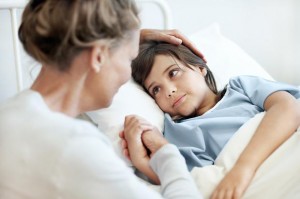 The American College of Emergency Physicians recently found an increase in children requiring medical intervention in states that have decriminalized marijuana. The call rate in theses states have increased by more than 30% per year between 2005 and 2011, while the call rate in non-legal states has not changed. There are currently 18 states and the District of Columbia that have passed legislation allowing medical marijuana, including edible products. George Sam Wang, MD, of the Rocky Mountain Poison and Drug Center in Denver states that these edible marijuana products may be the culprits to increased exposure in children. He states “kids can’t distinguish between products that contain marijuana and those that don’t,” and since edible marijuana tends to “contain higher concentrations of the active ingredient, tetrahydrocannabinol,” adverse effects are more likely to result when children ingest these products.
The American College of Emergency Physicians recently found an increase in children requiring medical intervention in states that have decriminalized marijuana. The call rate in theses states have increased by more than 30% per year between 2005 and 2011, while the call rate in non-legal states has not changed. There are currently 18 states and the District of Columbia that have passed legislation allowing medical marijuana, including edible products. George Sam Wang, MD, of the Rocky Mountain Poison and Drug Center in Denver states that these edible marijuana products may be the culprits to increased exposure in children. He states “kids can’t distinguish between products that contain marijuana and those that don’t,” and since edible marijuana tends to “contain higher concentrations of the active ingredient, tetrahydrocannabinol,” adverse effects are more likely to result when children ingest these products.
These pediatric exposures lead to medical evaluations, clinical effects, and critical care admissions. Researchers say neurologic effects are most common and therapies usually involve administering intravenous fluids. As states continue to decriminalize marijuana, it’s important to advocate for the safety of children who may unknowingly ingest this drug. Requirements such as child-resistant packaging, warning labels, and public education are needed to help mitigate this crisis and keep young children safe.
Source: Science Daily

 New research is surfacing that links anesthesia to inhibited cognitive developments in children under four. Significant brain development occurs in young children at this time, and ketamine—a common anesthetic—has been shown to affect the brain’s learning ability. Studies began back in 2003 when Merle Paule, Ph.D., director of the Division of Neurotoxicology at the FDA’s National Center for Toxicological Research, began observing the effects of ketamine on young rhesus monkeys, since this species closely resembles humans in physiology and behavior. While the ketamine-exposed monkeys performed cognitive experiments less accurately than the control group, the affect of ketamine on human children requires further research.
New research is surfacing that links anesthesia to inhibited cognitive developments in children under four. Significant brain development occurs in young children at this time, and ketamine—a common anesthetic—has been shown to affect the brain’s learning ability. Studies began back in 2003 when Merle Paule, Ph.D., director of the Division of Neurotoxicology at the FDA’s National Center for Toxicological Research, began observing the effects of ketamine on young rhesus monkeys, since this species closely resembles humans in physiology and behavior. While the ketamine-exposed monkeys performed cognitive experiments less accurately than the control group, the affect of ketamine on human children requires further research.